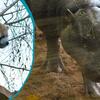Head keeper Jamie Baker said:
With fewer than 50 Bali starlings left in their native Indonesian forests, these birds are one of the rarest species on the planet. The devastating effects of trapping for the illegal songbird trade and habitat destruction across Indonesia had almost wiped out this species before modern zoological facilities stepped in to save them.
The keeper team are proud to share that Battersea’s resident pair of Bali starlings; Casper and Cleopatra, have had an incredibly successful breeding season, a huge achievement for the European Endangered Species Breeding Programme set up to save them from extinction. In fact, this year BPCZ has been one of the most successful zoos in the UK at breeding these rare tropical birds, with the chicks born at Battersea providing much needed stability for the disappearing species.
The species is renowned for being difficult to pair up and successfully breed, so four chicks is a huge success for the zookeepers at Battersea. It is hoped that once they mature, they will move to other accredited zoos within Europe to support the survival of their species and safeguard a population that could one day return to their native forests.
BPCZ supports a variety of conservation programmes for endangered species across the globe, as well promoting conservation through education; welcoming over 8500 school children to the zoo every year to participate in workshops around adaptations, the food chain, habitats, and animal welfare.
Related Members
-
News
 Belfast Zoo helps to bring Christmas joy to Children’s Hospital 19th December, 2025Belfast Zoo joined the Lord Mayor of Belfast, Councillor Tracy Kelly, on Monday (15th December) to help bring festive cheer to the Royal Belfast Hospital…
Belfast Zoo helps to bring Christmas joy to Children’s Hospital 19th December, 2025Belfast Zoo joined the Lord Mayor of Belfast, Councillor Tracy Kelly, on Monday (15th December) to help bring festive cheer to the Royal Belfast Hospital… -
News
 Colchester Zoological Society welcomes new arrivals 19th December, 2025This December, Colchester Zoological Society (CZS) welcomed some exciting new arrivals! A young male pygmy hippo, Mikolas, from Zoo Dvur Kralove…
Colchester Zoological Society welcomes new arrivals 19th December, 2025This December, Colchester Zoological Society (CZS) welcomed some exciting new arrivals! A young male pygmy hippo, Mikolas, from Zoo Dvur Kralove… -
News
.png?w=100&h=100&zc=1&f=jpeg&hash=8d175f93cde920c5ba23c8ea7f92e55a) Blog: Understanding the human side of zoos 16th December, 2025Why are zoo researchers increasingly looking to social science? Dr Nieky van Veggel explains the significance of understanding the human dimension…
Blog: Understanding the human side of zoos 16th December, 2025Why are zoo researchers increasingly looking to social science? Dr Nieky van Veggel explains the significance of understanding the human dimension…


